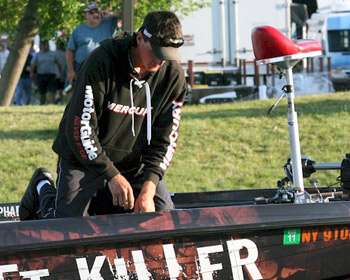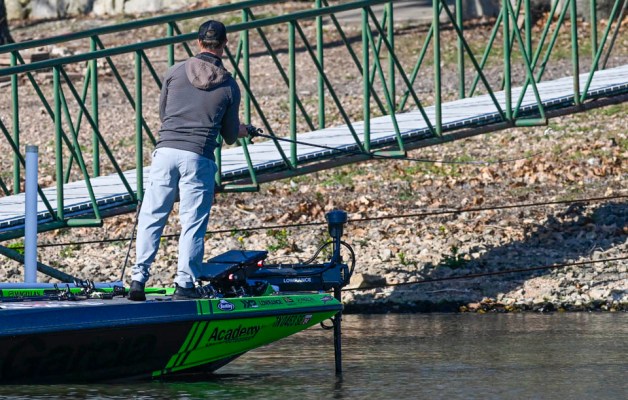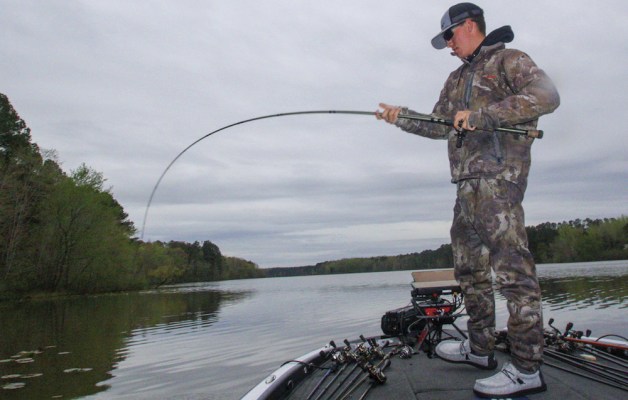
If you're looking to catch massive numbers of trophy smallmouth, you owe it to yourself to take a trip to the Great Lakes region. Over the last two years, the Bassmaster Elite Series has shown the world that this part of the work is an incredibly prolific smallmouth paradise.
The problem is that these waters can become brutally tough with only the slightest amount of wind, leading many anglers to shy away from the fantastic fishing opportunity the region presents. Elite Series pro Matthew Sphar, who grew up in upstate New York, knows firsthand how tumultuous Erie can be. As such, he's refined a simple strategy to combat the demands big water poses on his equipment and psyche. "I'm used to running rough water, even though I don't like it," he says.
"It's definitely something that I've grown accustomed to, but I've learned that in order to keep myself safe, there's a mandatory pre-trip checklist that I go through." Starting with his boat's hull, Sphar will check each stress point to ensure that everything is ship-shape. "First I make sure that the seam of my boat is still together and solid," he says. "I've pulled all the screws out from underneath the bumper rail of my boat and added Gorilla glue just to make sure that they don't back out."
Once the hull passes inspection, Sphar moves to the interior — placing particular focus on his trolling motor and electronics. "You really want to make sure that your trolling motor is strapped on securely," he says. "I've added an extra strap to my trolling motor, which really helps keep it down tight in big waves.
"The other thing that I've done is to add RAM mounts to all of my electronics. I will inspect both the trolling motor and electronics to make sure they're all buttoned down before I ever put the boat in the water." Sphar has also added an extra bilge pump as an additional measure of safety. "Having an additional (bilge) pump in the floor of the boat to help pump the water out quicker can be a life saver," he says. "It can definitely save you if you were to blow a fuse on your primary system, and it's just a nice back-up deal that I like to have and be prepared to use just in case."
Sphar adds that inspecting his boat inside and out prior to putting it in the water not only saves time in the long run, but it can also be a potential life saver when faced with the huge waves that Erie and other large bodies of water can present. "You really need to make sure that everything is buttoned up tight before you leave," he stresses.
"I'm on my boat almost every day, but this is still a routine that I go through each time before I back it down the ramp." Sphar explains that the need to pay careful attention to every detail while underway is further heightened in big water as well. "I pay attention to everything when I'm in big water. You have to be aware of your boat's position and make sure that everything is tied down tight," he says, adding that making yourself as comfortable as possible not only eliminates distraction, but also allows you to keep focused on driving. "I've learned that anything I can do to make myself more comfortable when I'm in big water, the better off I'll be," Sphar explains. "I keep a pair of goggles that I can wear to keep water out of my eyes in really big waves.
Little things like that will make the trip a whole lot easier, and safer." Sphar insists that careful pre-trip planning and inspection is a must for any angler on any lake, and that failure to take such precautions on a lake like Erie is a risk that's just not worth taking. "The biggest thing that I would pass on to other anglers is to just make sure before you leave the ramp that everything in your boat — the pumps, the trolling motor, your batteries, all your electronics — are working," he says.
"A lot of times, taking the time to go through that little checklist will keep you from having to make an urgent call to the Coast Guard at some point in the day."
(Provided by Z3 Media)




